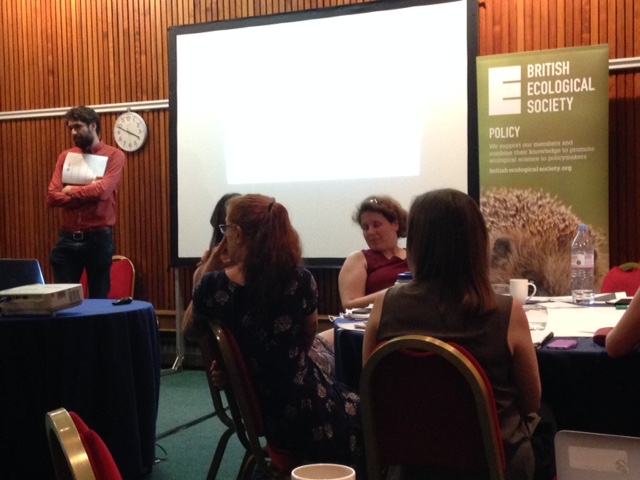From Cornwall to ZSL London for a day on how to engage with Parliament
Please note that since writing this summary, the country has gone to the polling station and a new government is being formed…

On Thursday 25 May I travelled from Cornwall to London to attend the first ever BES/ZSL one day workshop on “Engaging with Parliament and Responding to Inquiries”. In my view, this workshop was timely as Brexit, whether we agree with it or not, will reassess environmental legislation. The moment to engage is now; and as the snap election was not on the cards when I registered, the workshop was even more interesting!
The day started with opening talks about what Parliament is and how it works, given by Ben Connor, our own BES Policy Manager. In this brief talk we were told the difference between parliament and government and the structure and function of parliament. We were also introduced to how the parliament scrutinises the government and debates issues, for example via Select Committees. We were also told about POST -the Parliamentary Office for Science and Technology.
Next we heard from Dr Jonathan Wentworth, POST scientific advisor for Energy and Environment: what an eye opener! POST’s overarching objective is to support and advance the use of evidence in Parliament. Interestingly, scientific evidence is just one kind of evidence considered in the scrutiny of government by Parliament. Jonathan also mentioned that politicians tend to be more reluctant to ‘accept’ any kind of evidence the more controversial the issue. The other interesting information was that academic research is also not commonly thought as ‘evidence’ by MPs as most MPs have a legal mind and they think of evidence mostly as legal evidence.
The day progressed with a talk on Select Committees and how to engage with them by Martin Smith, Committee Specialist at the House of Commons Science and Technology Committee. A Select Committee’s function is to scrutinise a government department or cross-cutting theme, such as the EFRA committee (scrutinises Defra!). We were told about the cross-party composition of a Select Committee and how topics are chosen, how evidence is gathered and how recommendations are made. Important points to remember: the government must respond to recommendations made by a Select Committee and about 40% of recommendations are taken up by the government! Therefore, Select Committees have great influence and anyone can submit evidence (and written evidence is very important). We were also told what makes a good submission (through the portal in Word) and that being brief and writing for non-experts is recommended. If you want to suggest a topic for scrutiny by the Science and Technology Committee: use #MyScienceInquiry.
Next Camilla Morrison-Bell (BES Senior Policy Officer) talked to us about All Party Parliamentary Groups (APPGs), which are cross-party informal groups (1024 APPGs existed on 2 May!). They cover many topics and offer an opportunity for you to be included as an expert speaker. For the expert: peruse the portal, lookout for relevant debates and develop a brief but also contact the secretariat and ask to be put on mailing list. All in all: identify Parliamentarians with an interest in your subject area (search in ‘they work for you’ website) and get involved. If you decide to get involved, keep all communications brief, targeted, relevant and most importantly actionable (have a look at www.writetothem.com).
After a very nice lunch, we did some practical tasks on ‘how to engage’ and suggested topics for parliamentary scrutiny, followed by some interesting discussions.
So that was the summary of the day, but most importantly, attend one of these BES policy workshops – they are worth it, particularly now we have our MPs back. Remember, with all the changes Brexit can bring, now is the time to get involved if you, like me, want scientifically informed changes.
Like what we stand for?
Support our mission and help develop the next generation of ecologists by donating to the British Ecological Society.